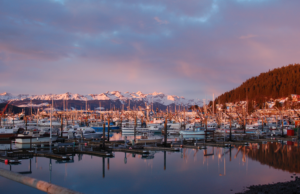Community Corner
By Lisa Matlock, Outreach Coordinator

Until 2010, the 1989 Exxon Valdez oil spill was the largest oil spill disaster in U.S. waters. That March, people around the world turned on the news to see our devastated wildlife and beaches. No one doubted that the environment of Prince William Sound and other downstream areas were hurt. What was not apparent to almost everyone was the short and long term damage to the people in the region’s communities.
Technological disasters, such as an oil or chemical spill, a nuclear accident, or a large building fire or collapse, affect communities differently than natural disasters. A technological disaster is caused by humans, and there is a person or persons who can be blamed for the incident. Natural disasters have no one to blame. Natural disasters, such as floods, hurricanes, and earthquakes, can often be predicted and prepared for. Technological disasters are often unexpected.
After the Exxon Valdez spill, the council funded research on how technological disasters affect people living in the area compared to natural disasters.
The study found that natural disasters tend to build “therapeutic communities,’” while technological disasters can result in “corrosive communities.” Therapeutic communities are places where people pull together and focus on a return to pre-disaster conditions. Local leaders usually coordinate response activities in a natural disaster. Corrosive communities result from technological disasters for a variety of reasons, but especially because:
- entities with little or no connection to the community may be leading recovery efforts;
- consequences of the disaster are less known, which may foster higher levels of stress and anxiety;
- responses may be drawn out,
- resulting litigation can last for decades; and
- conflicts within the community may erupt between people who are affected differently by the incident’s response.
Peer listeners can help heal corrosive communities
After the Exxon Valdez oil spill, council-sponsored sociologists studied the community of Cordova and impacts the spill had on its social fabric. From this research, the council helped develop the “Peer Listener” program. This program is designed to help communities be more resilient in the face of a technological disaster.
The council has sponsored Peer Listener trainings in communities all over the Exxon Valdez oil spill region. Anyone can learn to be a Peer Listener. The program teaches how to listen actively to neighbors experiencing emotional, physical, and/or behavioral difficulties in response to a technological disaster in the area. Peer Listeners are also instructed in how to assist people in distress to find help and to consider positive ways to cope with their situations. The Peer Listener program, led in part by several council volunteers, was used in the Gulf of Mexico after the Deepwater Horizon spill helping communities in the south recuperate socially after that disaster. Long term research continues today in the Gulf of Mexico on the long-term social effects of the spill.
Training professionals to train listeners
For the first time this fall, the council is sponsoring a special training that will help create a cadre of Peer Listener instructors throughout communities in the Exxon Valdez oil spill region. Called the Peer Listener Trainer workshop, this course will specifically guide behavioral health professionals who serve these communities in the methods needed to train others to become Peer Listeners.
The best way for a community to respond to any kind of disaster is to have responders of all types trained before anything bad occurs. The council hopes this workshop will result in Peer Listener trainings being offered locally by dedicated, home-grown experts. By preparing Peer Listener Trainers now, more members of all of our communities will be ready to help people bounce back in healthy ways in the face of tragedy.